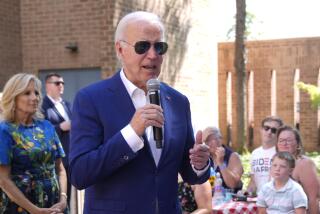Perot Vows Top Priority for Cities, Mayors Say
- Share via
DALLAS — After meeting for two hours with undeclared presidential candidate Ross Perot, five big-city mayors said Monday that he promised to make revitalizing the cities his No. 1 priority if he is elected in November.
Perot apparently did not endorse specific programs during the gathering, which took place at his invitation to discuss urban problems in the wake of the Los Angeles rioting.
But the Texas billionaire, whose prospective independent run for the presidency has turned the political world upside down, was able to broaden his Western range-rider and tough-talking tycoon image by demonstrating his concern for the cities and the citizens who live there--including a large number of minorities, a constituency that up to now has been relatively slow to climb aboard his bandwagon.
The mayors, in turn, were able to focus attention on their urban agenda and to put pressure on President Bush and likely Democratic nominee Bill Clinton to heed their concerns and grant them similar audiences. Clinton has met with mayors before, but Boston Mayor Raymond L. Flynn said the U.S. Conference of Mayors has been unsuccessfully trying to see Bush for the last year. Flynn is president of the organization.
“Perot is a hot item in America today and we are trying to get our issues put on the front burner,” Flynn said at a press conference.
San Diego Mayor Maureen O’Connor said Perot pledged to meet with the mayors again in “the near future” to go over “detail by detail” the Conference of Mayors’ seven-point, $34.8-billion proposal to stimulate employment and speed recovery from the recession.
In addition to O’Connor and Flynn, the other mayors were Michael White of Cleveland and Sharpe James of Newark--all Democrats--and independent Xavier Suarez of Miami, who supported President Bush in the 1988 campaign. James and White are committed to Clinton, but O’Connor and Flynn did not rule out endorsing Perot at some point.
Flynn quoted Perot as saying that, if elected, he would meet each month with mayors, whom he described as being “on the front line” of urban problems.
“Ross Perot is a powerful force in the politics of 1992,” Flynn said. Perot “understands very clearly” the importance of cities to the health of the American economy.
During the meeting, Perot promised to keep in such close touch with urban problems that “you mayors are going to get sick of me,” said the executive director of the U.S. Conference of Mayors, Tom Cochran.
Perot’s willingness “to talk about the problems of the cities, to talk about a domestic agenda, to talk about education, to talk about day care, means that Bill Clinton, whom I support, is going to have to be more specific about what he is going to offer minorities,” said James, who is black.
The urban agenda that the mayors presented to Perot included $15 billion in direct aid in such areas as public safety, public works and infrastructure, another $5 billion for public works projects, $6 billion in block grants for community development, $4 billion for transportation projects, $2.8 billion for job training and $2 billion in small-business loans.
Asked where the money would come from, Flynn said that, like the money for bailing out the federal savings and loans and foreign aid, it would “have to come from the taxpayers.”
“What we’re saying is that it’s time to begin spending American money on Americans,” White said.
More to Read
Get the L.A. Times Politics newsletter
Deeply reported insights into legislation, politics and policy from Sacramento, Washington and beyond. In your inbox twice per week.
You may occasionally receive promotional content from the Los Angeles Times.









